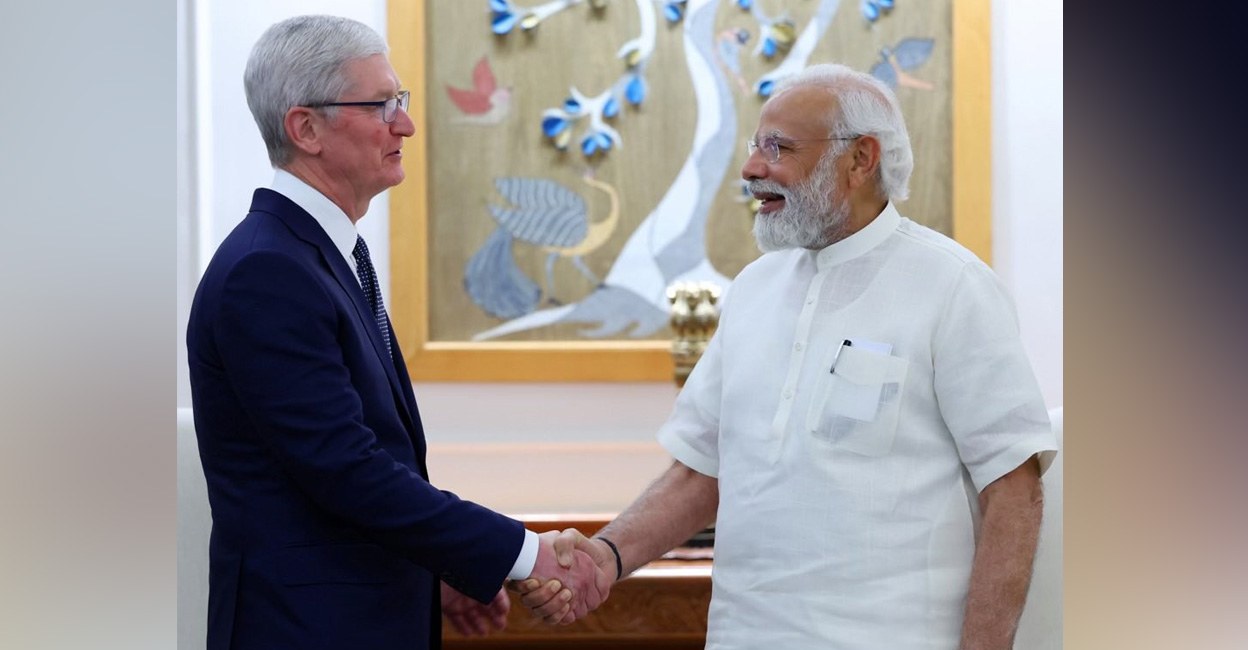Introduction
In a bold strategic maneuver, Apple Inc. has significantly ramped up its iPhone production in India, challenging China’s long-standing dominance in the tech manufacturing sector. Apple manufactured a whopping $14 billion worth of iPhones in India during fiscal 2024, which is double the previous year’s output.
This surge in output marks a pivotal moment for the tech giant as it seeks to diversify its production base and reduce dependence on its Chinese manufacturing hub.
By doubling its iPhone production in India, Apple is not only expanding its global manufacturing footprint but also signaling a profound shift in the dynamics of the technology industry.
Follow us on Linkedin for everything around Semiconductors & AI
Production Surge:
Apple’s decision to ramp up iPhone production in India signals a strategic pivot aimed at reducing its reliance on China, which has long been the primary manufacturing hub for the tech giant.
By doubling its output in India, Apple is not only expanding its global manufacturing footprint but also hedging against potential disruptions in the global supply chain.
This growth isn’t sudden. Apple started assembling iPhones in India in 2017, but initially focused on older or entry-level models.
The shift towards high-end models like iPhone 14 and 15 happened only in 2021-22. The Indian government’s production-linked incentive (PLI) scheme has played a crucial role in attracting Apple. This scheme offers financial benefits to companies that manufacture electronics in India.
Read More: Twice the Speed, Half the Power of Nvidia’s H100: Intel Releases AI Chip Gaudi 3 – techovedas
Shifting Focus:
The move to increase production in India reflects Apple’s proactive approach to navigate the complexities of the current geopolitical landscape.
Amidst escalating tensions between the United States and China, coupled with uncertainties surrounding trade policies and tariffs.
Apple is strategically diversifying its manufacturing operations to safeguard its interests and ensure business continuity.
Read More: What is “iPhone of AI” Moment? Sam Altman & Ex Apple Exec Secretive Project – techovedas
India’s Share:
With around 14% of iPhones now assembled in India, the country’s significance as a manufacturing hub for Apple continues to grow.
This equates to roughly 1 in every 7 iPhones being produced in India, highlighting the country’s emergence as a key player in the global technology supply chain.
Read More: 10 Cheapest Electric Vehicles (EVs) of 2024: Affordable Green Mobility – techovedas
Manufacturing Partners:
Leading the charge in this production surge are Apple’s manufacturing partners in India, namely Foxconn and Pegatron.
Together, these industry giants account for a significant portion of the increased output, with Foxconn contributing 67% and Pegatron 17%.
The Tata Group, which recently acquired Wistron’s Indian facility, now plays a crucial role in manufacturing the remaining iPhones.
Interestingly, a significant portion (around 70%) of India-made iPhones are exported. This makes India an export hub for Apple besides catering to the domestic market.
Read More: Nvidia, Amazon Pour $110 Million into AI with US- Japan University Alliance – techovedas
Future Expansion:
Apple is reportedly looking to expand its production capacity further. Foxconn, for example, recently purchased land near Bengaluru for a new facility.
Read More: 5 High Growth Stocks From the World of Semiconductors – techovedas
Significance for Apple and India:
Apple’s decision to scale up iPhone production in India carries significant implications for both the company and the country.
For Apple, it represents a strategic shift towards diversification and risk mitigation, reducing its dependence on China and ensuring greater flexibility in its supply chain operations.
For India, this surge in production translates into increased job creation, technology transfer, and a boost to the country’s manufacturing capabilities.
Moreover, it reaffirms India’s position as a preferred destination for global tech companies seeking to leverage its skilled workforce and favorable business environment.
Read more AMD vs Intel: Which CPU Reigns Supreme in 2024? – techovedas
Challenges Remain:
While the outlook is positive, there are still challenges to overcome:
Component Sourcing: A large part of the iPhone components are still manufactured in China. Building a robust domestic supply chain for these components would be crucial for sustained growth.
Skilled Workforce: India needs to develop a skilled workforce to meet the demands of high-tech manufacturing.
Overall, Apple’s increasing focus on India presents a win-win situation for both parties. It will be interesting to see how this trend progresses in the coming years.
Read More: What are Top 7 Customers of TSMC in 2023 – techovedas
Conclusion
In conclusion, Apple’s decision to ramp up iPhone production in India underscores its commitment to adapt to evolving geopolitical realities and mitigate risks associated with overreliance on any single market.
This strategic shift not only benefits Apple in terms of diversification and flexibility but also augurs well for India’s burgeoning manufacturing sector, positioning the country as a key player in the global technology landscape.
As Apple continues to navigate the complexities of the global market, its partnership with India is poised to yield mutual benefits, driving innovation, growth, and economic development for both parties.



